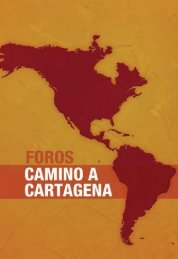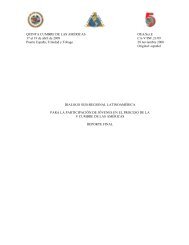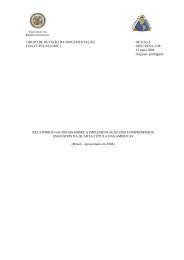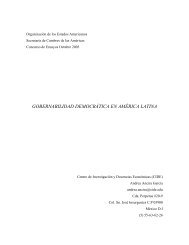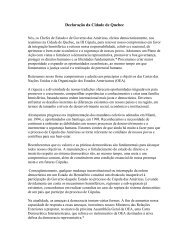The Road to Hemispheric Cooperation: Beyond the Cartagena
The Road to Hemispheric Cooperation: Beyond the Cartagena
The Road to Hemispheric Cooperation: Beyond the Cartagena
Create successful ePaper yourself
Turn your PDF publications into a flip-book with our unique Google optimized e-Paper software.
1978. For <strong>the</strong> criteria used in determining if human rights violations<br />
do occur in a member state, see <strong>the</strong> introduction <strong>to</strong> Chapter IV<br />
in <strong>the</strong> Commission’s Annual Report, available at: http://www.cidh.<br />
oas.org/annualrep/2010eng/TOC.htm. See also R. K. Goldman,<br />
“His<strong>to</strong>ry and Action: <strong>The</strong> Inter-American Human Rights system and<br />
<strong>the</strong> Role of <strong>the</strong> Inter-American Commission on Human Rights,” Human<br />
Rights Quarterly, Vol. 31, pp. 856–887, 2009.<br />
17 Presidents Correa, Morales and Chávez have taken lately <strong>to</strong><br />
strongly criticizing <strong>the</strong> performance and decisions of <strong>the</strong> IACHR<br />
and <strong>the</strong> Inter-American Court of Human Rights, <strong>the</strong> pillars of <strong>the</strong><br />
Inter-American Human Rights system, along with <strong>the</strong> Inter-American<br />
Convention on Human Rights of 1969. <strong>The</strong>ir main argument is<br />
that <strong>the</strong>y are instruments of U.S. imperialism or manipulated by <strong>the</strong><br />
State Department. As recently as May 3, 2012, Venezuelan Foreign<br />
Minister Nicolás Maduro, at a UNASUR meeting of Foreign Ministers<br />
in Colombia, echoed this position, declaring that “it is time <strong>to</strong><br />
dismantle this decadent Court and Commission because <strong>the</strong>y intervene<br />
in our internal judicial affairs.” President Correa has recently<br />
commented that <strong>the</strong> OAS and <strong>the</strong> IACHR are “<strong>to</strong>tally dominated by<br />
<strong>the</strong> influence of <strong>the</strong> United States and <strong>the</strong>y have only served <strong>the</strong><br />
foreign policy interest of that country.” (Telesur, May 9, 2012.) <strong>The</strong><br />
fact is, however, <strong>the</strong> Commission has issued reports demanding<br />
that <strong>the</strong> U.S. government adopt urgent measures <strong>to</strong> have a competent<br />
tribunal <strong>to</strong> try <strong>the</strong> Guantanamo prisoners accused of terrorism,<br />
has held public hearings on <strong>the</strong> subject, and has asked <strong>the</strong> U.S.<br />
government <strong>to</strong> close <strong>the</strong> prisoners’ camp. Similarly, <strong>the</strong> IACHR has<br />
strongly criticized <strong>the</strong> U.S. government’s detention practices of illegal<br />
immigrants. Paradoxically, <strong>the</strong> criticism and attacks against <strong>the</strong><br />
Commission and <strong>the</strong> Court, and <strong>the</strong> OAS in general, is similar <strong>to</strong><br />
complaints by U.S. legisla<strong>to</strong>rs and some high-ranking State Department<br />
officials who think <strong>the</strong> OAS is useless because it is dominated<br />
by anti-American populist governments. O<strong>the</strong>rs see U.S. passivity<br />
and disinterest in <strong>the</strong> organization and <strong>the</strong> region as beginning after<br />
Latin America rejected <strong>the</strong> U.S. proposal for a free trade zone for<br />
<strong>the</strong> Americas in Mar del Plata, Argentina, in 2006. Anyone who has<br />
studied or observed <strong>the</strong> functioning of <strong>the</strong>se inter-American institutions,<br />
or has served in <strong>the</strong>m, knows full well that U.S. dominance is<br />
no longer operative, as might have been during <strong>the</strong> Cold War years.<br />
<strong>The</strong> reasons are many, but <strong>the</strong> fact is that <strong>the</strong> U.S. government can<br />
no longer impose its will in <strong>the</strong>se bodies, just as it cannot do so in its<br />
bilateral relations with Latin American countries (although perhaps<br />
with a few exceptions). We are in a different era of inter-American<br />
relations. To pretend or claim o<strong>the</strong>rwise is <strong>to</strong> ignore this new reality.<br />
And one may suspect that governments that make such denunciations<br />
are using <strong>the</strong>m as smokescreens <strong>to</strong> cover <strong>the</strong>ir own violations<br />
of human rights and <strong>the</strong> democratic principles, values and practices<br />
established in <strong>the</strong> IADC. Strangely enough, though, Argentina—a<br />
country whose people have greatly benefitted from <strong>the</strong> Commission<br />
and <strong>the</strong> Court’s defense of human rights, and whose democratic<br />
governments have always praised <strong>the</strong>m—has remained silent and<br />
has not come publicly <strong>to</strong> <strong>the</strong> defense of <strong>the</strong> system.<br />
18 To accept a non-democratic Cuba’s participation in <strong>the</strong> activities<br />
of <strong>the</strong> hemispheric community of democracies would require a<br />
change in <strong>the</strong> rules for participating in <strong>the</strong> OAS and <strong>the</strong> presidential<br />
summits. Also, if <strong>the</strong> illegal Micheletti government in Honduras,<br />
which replaced Zelaya’s government after his ouster by <strong>the</strong> military<br />
in 2009, was correctly suspended from <strong>the</strong> OAS (even though<br />
programmed presidential elections were already on course), it<br />
stands <strong>to</strong> reason that <strong>the</strong> Cuban dicta<strong>to</strong>rship would remain suspended<br />
from <strong>the</strong> OAS until it decides <strong>to</strong> abide by <strong>the</strong> Charter. If<br />
Cuba is accepted without complying with <strong>the</strong> Charter’s principles,<br />
<strong>the</strong> hemispheric community would also have <strong>to</strong> accept <strong>the</strong> participation<br />
of any future government that emerges out of a coup.<br />
19 For example, <strong>the</strong> OAS would benefit from a voice or involvement<br />
of <strong>the</strong> legislative branch in <strong>the</strong> decision-making process<br />
of <strong>the</strong> organization. It is this branch, after all, that eventually<br />
has <strong>to</strong> ratify or internalize international agreements reached by<br />
representatives of <strong>the</strong> executive branch, and has <strong>to</strong> approve <strong>the</strong><br />
national budget, which contains payments or contributions <strong>to</strong><br />
<strong>the</strong> organization. See again Rubén M. Perina, “<strong>The</strong> Role of <strong>the</strong><br />
Organization of American States.”<br />
20 See a critical view of <strong>the</strong> OAS elec<strong>to</strong>ral moni<strong>to</strong>ring in Rubén M. Perina,<br />
“<strong>The</strong> Future of Elec<strong>to</strong>ral Observations,” Americas Quarterly,<br />
Spring 2010.<br />
21 I say <strong>the</strong>oretically because even <strong>the</strong> assessment could be s<strong>to</strong>pped<br />
if <strong>the</strong>re is no consensus on <strong>the</strong> agenda of <strong>the</strong> meeting.<br />
22 See Articles 18 and 24 of <strong>the</strong> Charter.<br />
23 Known in Spanish as MESICIC: Mecanismo de Seguimien<strong>to</strong> e Implementación<br />
de la Convención Inter Americana contra la Corrupción.<br />
24 For example, Article 75 includes <strong>the</strong> Inter-American Convention on<br />
Human Rights and o<strong>the</strong>rs.<br />
25 <strong>The</strong>re are those who argue, however, that as a treaty, it would become<br />
a less flexible and more difficult <strong>to</strong> modify as circumstances<br />
change. And if <strong>the</strong> treaty is not ratified by a two-thirds majority of<br />
members, it would not enter in<strong>to</strong> force nor would it be applicable <strong>to</strong><br />
those who do not ratify it.<br />
26 Decisions at <strong>the</strong> OAS Permanent Council are traditionally made by<br />
consensus; and if this is not assured, a vote on a resolution would<br />
probably not even be called. A vote is considered a polarizing practice<br />
that breaks <strong>the</strong> multilateral body’s harmony; but if it is called,<br />
<strong>the</strong> resolution would still need a simple majority of 18 members <strong>to</strong><br />
pass, which may not be easy <strong>to</strong> obtain at this time in his<strong>to</strong>ry.<br />
27 Imagine what would happen <strong>to</strong> its commercial relations if Colombia<br />
were <strong>to</strong> propose a collective assessment of <strong>the</strong> situation in Venezuela.<br />
28 O<strong>the</strong>r issues <strong>the</strong>y could not agreed on were Malvinas/Falklands<br />
and <strong>the</strong> fight against drug trafficking and consumption.<br />
<strong>The</strong> <strong>Road</strong> <strong>to</strong> <strong>Hemispheric</strong> <strong>Cooperation</strong>: <strong>Beyond</strong> <strong>the</strong> <strong>Cartagena</strong> Summit of <strong>the</strong> Americas<br />
<strong>The</strong> Brookings Institution ❘ Latin America Initiative<br />
87



